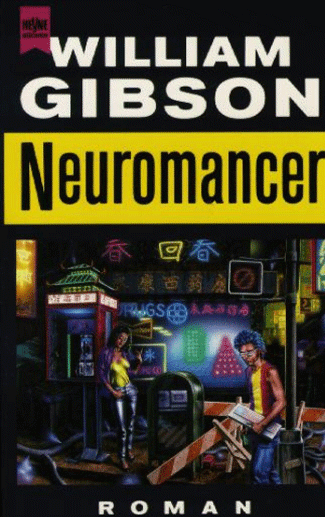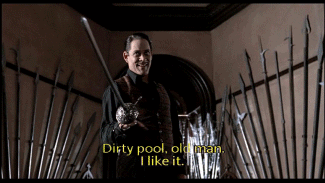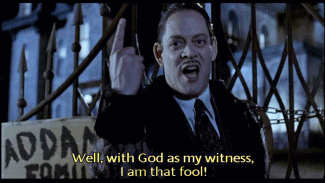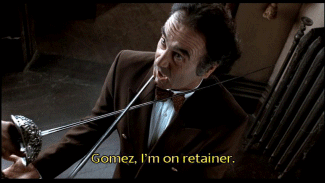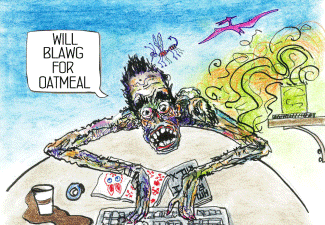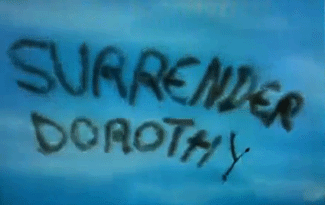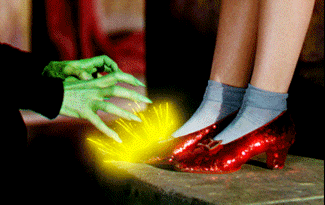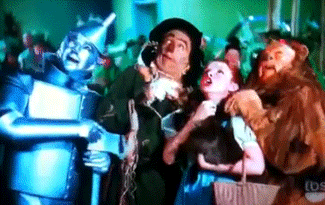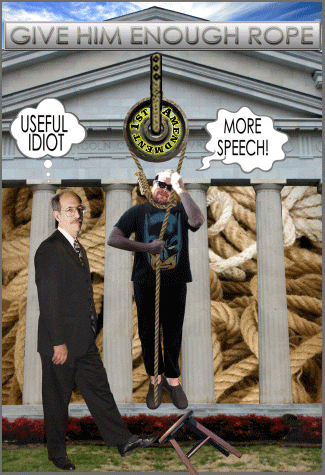A Topic of Discussion Small Enough For Little Mindsby Charles Carreon
July 26, 2013
 A Question of Perspective, by Tara Carreon
A Question of Perspective, by Tara Carreon
[Kenneth Popehat White] Elimination of this pest could rid humanity of so much suffering!
(Small Problems For Small Minds)Recently I’ve been reflecting on why Rapeutationists rarely bend their vicious tongues to the task of criticizing truly evil people. For example, I’m sitting here reading Judge
Katherine B. Forrest’s opinion enjoining President Obama from arresting and detaining Christopher Hedges, six other defendants, and the rest of us exposed to indefinite detention here in USA-land. Obama’s lawyers tried to defend the unconstitutional authority bestowed upon him by the kitten Congress in Section 1021(b) of the National Defense Authorization Act for the Fiscal Year 2012 (the “NDAA”) in the usual way – by offering no evidence, putting on no defense other than executive dogma, and stonewalling Judge Forrest’s questions with bland responses like “we are not prepared to address that.” It’s a damn good read, and really important for anyone who thinks our President’s ongoing power grab is being grossly under-reported, because this is a classic example of misplaced journalistic priorities.
Judge Forrest’s opinion concluded that Christopher Hedges and the other journalists had a well-founded fear that they could be arrested and indefinitely detained for their work.
Judge Forrest concluded that author Alexa O’Brien had deliberately not published certain writings because she feared they could result in her arrest and indefinite detention. (Opinion, page 23.) Now that’s a chilling effect on speech of a major sort!Judge Forrest issued her opinion while my Rapeutation was in full swing – on August 12, 2012 – but none of my Rapeutationists mentioned a word of it. Purportedly, they’re all champions of the First Amendment, and the First Amendment is intended to protect people from the Government, and here the Government is actually silencing people with legal threats, and the Rapeutationists are silent.
Wouldn’t you think some of our lead Rapeutationists – ever on guard against attacks on the Precious First Amendment – would sound the alarm? A big defender of liberty like Ken Popehat White would certainly post about it! Public Citizen would be jostling for a seat at counsel table for Hedges! EFF would be hopping mad! But they weren’t – site specific searches for “hedges v. obama” on Popehat.com, citizen.org and EFF.org produce null results.
The Rapo-sites are focused on really dangerous people, like Charles Carreon, the lawyer who never quits, never shuts up, never sits down. They’re not distracted from the real target. They know the truth — one guy like Carreon is more dangerous than a thousand Obamas. Presidents come and go, but lawyers like Carreon will keep jacking up cartoonists for Mercedes money until they are finally put down with a silver bullet. Is it possible the attentions of the Rapeutationists are misplaced? Possible? Certain, I say!
For an explanation of this silence regarding the retirement of the Presidential power of indefinite internment for inadequately-described speech-crimes, we must turn to
the works of Robert Northcote Parkinson.Robert Northcote Parkinson is an author well-known to most business students of my vintage, the originator of “Parkinson’s Law,” that states, “Work expands to fill the time available for its completion.” Parkinson’s Law explains why the war on terror won’t be won, and
why military contracts often are closed out without anything being delivered – the military, and its no-bid contractors, hate deadlines. But without a deadline, there is no demand. That’s why, if you don’t do it promptly, the police will say, “Get your ass on the ground, now.” Officer Gusstep doesn’t want to be waiting around all day while you find something comfy to stretch out on. So he emphasizes the time for completion of the task.
Parkinson’s Law is fun, but it doesn’t explain what I’m here to talk about. Rather, it’s another rule of Parkinson’s: “the time spent on a task is inversely proportional to its importance.” I summarize it as: “small minds can only solve small problems.”
As an example of the operation of the rule, Parkinson describes how a public authority would approve a proposed nuclear plant in five minutes, and take half an hour to discuss the design of a bicycle shed. His discussion of the matter goes like this:
chairman we come now to item nine. our treasurer, mr. mcphail, will report.
mr. mcphail the estimate for the atomic reactor is before you, sir, set forth in appendix h of the subcommittee’s report. you will see that the general design and layout has been approved by professor mcfission. the total cost will amount to $10,000,000. the contractors, messrs. mcnab and mchash, consider that the work should be complete by april, 1959. mr. mcfee, the consulting engineer, warns us that we should not count on completion before october, at the earliest. in this view he is supported by dr. mcheap, the well-known geophysicist, who refers to the probable need for piling at the lower end of the site. the plan of the main building is before you–see appendix ix–and the blueprint is laid on the table. i shall be glad to give any further information that members of this committee may require.
chairman thank you, mr. mcphail, for your very lucid explanation of the plan as proposed. i will now invite the members present to give us their views.
it is necessary to pause at this point and consider what views the members are likely to have. let us suppose that they number eleven, including the chairman but excluding the secretary. of these eleven members, four — including the chairman — do not know what a reactor is. of the remainder, three do not know what it is for. of those who know its purpose, only two have the least idea of what it should cost. one of these is mr. isaacson, the other is mr. brickworth. either is in a position to say something. we may suppose that mr. isaacson is the first to speak.
mr. isaacson well, mr. chairman. i could wish that i felt more confidence in our contractors and consultant. had we gone to professor levi in the first instance, and had the contract been given to messrs. david and goliath, i should have been happier about the whole scheme. mr. lyon-daniels would not have wasted our time with wild guesses about the possible delay in completion, and dr. moses bullrush would have told us definitely whether piling would be wanted or not.
chairman i am sure we all appreciate mr. isaacson’s anxiety to complete this work in the best possible way. i feel, however, that it is rather late in the day to call in new technical advisers. i admit that the main contract has still to be signed, but we have already spent very large sums. if we reject the advice for which we have paid, we shall have to pay as much again.
(other members murmur agreement.)
mr. isaacson i should like my observation to be minuted.
chairman certainly. perhaps mr. brickworth also has something to say on this matter?
now mr. brickworth is almost the only man there who knows what he is talking about. there is a great deal he could say. he distrusts that round figure of $10,000,000. why should it come out to exactly that? why need they demolish the old building to make room for the new approach? why is so large a sum set aside for “contingencies”? and who is mcheap, anyway? is he the man who was sued last year by the trickle and driedup oil corporation? but brickworth does not know where to begin. the other members could not read the blueprint if he referred to it. he would have to begin by explaining what a reactor is and no one there would admit that he did not already know. better to say nothing.
mr. brickworth i have no comment to make.
chairman does any other member wish to speak? very well. i may take it then that the plans and estimates are approved? thank you. may i now sign the main contract on your behalf? (murmur of agreement) thank you. we can now move on to item ten.
allowing a few seconds for rustling papers and unrolling diagrams, the time spent on item nine will have been just two minutes and a half. the meeting is going well. but some members feel uneasy about item nine. they wonder inwardly whether they have really been pulling their weight. it is too late to query that reactor scheme, but they would like to demonstrate, before the meeting ends, that they are alive to all that is going on.
chairman item ten. bicycle shed for the use of the clerical staff. an estimate has been received from messrs. bodger and woodworm, who undertake to complete the work for the sum of $2350. plans and specification are before you, gentlemen.
mr. softleigh surely, mr. chairman, this sum is excessive. i note that the roof is to be of aluminum. would not asbestos be cheaper?
mr. holdfast i agree with mr. softleigh about the cost, but the roof should, in my opinion, be of galvanized iron. i incline to think that the shed could be built for $2000, or even less.
mr. daring i would go further, mr. chairman. i question whether this shed is really necessary. we do too much for our staff as it is. they are never satisfied, that is the trouble. they will be wanting garages next.
mr. holdfast no, i can’t support mr. daring on this occasion. i think that the shed is needed. it is a question of material and cost…
the debate is fairly launched. a sum of $2350 is well within everybody’s comprehension. everyone can visualize a bicycle shed. discussion goes on, therefore, for forty-five minutes, with the possible result of saving some $300. members at length sit back with a feeling of achievement.
chairman item eleven. refreshments supplied at meetings of the joint welfare committee. monthly, $4.75.
mr. softleigh what type of refreshment is supplied on these occasions?
chairman coffee, i understand.
mr. holdfast and this means an annual charge of — let me see — $57?
chairman that is so.
mr. daring well, really, mr. chairman. i question whether this is justified. how long do these meetings last?
Everyone who has attended public meetings of public entities is familiar with proceedings like this. For really complex issues with huge budgets, the time on the agenda for discussion is miniscule, even when the room is bursting with citizens wanting to speak. My favorite superquick bad decision by civic authorities who were faced with a question too large for their capacities was an event I wrote about over ten years ago in The Ashland Free Press –
The Great McCloud Water Caper of 2003. Back in that faraway time, when many Rapeutationists were still becoming familiar with the pleasures of playing with their own joysticks and did not realize they would someday grow up to be zombies, the City of Dunsmuir, finding itself in possession of over a billion acre-feet of water drawn from the peaks of Mt. Shasta and other glacier-decked snowfields, sold it all to Nestle corporation for about $40,000. Thanks to some damn good luck, Judge Kosel’s nullification of the deal under the California Environmental Quality Act, although reversed on appeal, was ultimately given effect, and the insanely bad deal was scuttled.
So there you have it – another mystery handily solved by Charles Carreon. I was targeted for Rapeutation because I am a person perceived by Rapeutationists as an eminently misunderstandable person whose story would not challenge the mental capacities of the zombie horde. To misunderstand Judge Forrest’s opinion, Rapeutationists would have to read it, and at one-hundred and twelve pages, without Ken Popehat White, or Paul Aryan Levy to supply an agreed-upon distorted meaning, that’s just a non-starter. Zombies can’t march in formation without leaders. The employed among them have to write so many words per day, and it is the number of those words, not their sense, that rings their little toy cash-registers. As for structurally unemployed folks like Chris Recouvreur – they’re not afraid that the government is coming for them – hell, they’re White Patriots! Indeed, to be fair to Ken White, a site-specific search for “NDAA” at Popehat.com (ndaa site:popehat.com) does give us a nice list of posts that reveal Ken for exactly what he is, in my opinion — another Republican talking-points shill who dishes out crap to liberals who hassle his pointy-headed peers. Say it ain’t so, Ken!
You might ask what happens where Rapeutationists actually try to talk about something important, like the NDAA. It ain’t pretty. Back in 2012, the NDAA was up for “re-authorization,” that as Judge Forrest explained, was actually not a re-authorization at all, but rather, a surreptitious expansion to include powers never before wielded by any President.
Rapo Mike Masnick at TechDirt, exercising his modest supply of grey matter, posted about some proposed expansions in the law. Not realizing this topic might require work he wasn’t equipped for, i.e., actual thought, Rapo Anonymous Coward lead off with this comment: “people hate people too much.” Granted, Anonymous Coward is an expert on the topic of hate – having a huge bile-sack in place of a prostate, and his fingers up the arse of a small army of sock-puppets to back him up when the rapo-action gets hot. But nihilists like Anonymous Coward always hit a dead end, and his next post revealed his true zombie nature, like a worm flicking from between the wizened cracks of his pie-hole:
“if there were no people, than it’s obvious that people would not have a problem with people…. thus people are both the source of the problem and the solution…”
Oh yes, that’s quite insightful, but does it really take words to say it? Can’t you just point to your empty head and grin like an idiot?
Take-home lesson? If you want to focus on unimportant stuff, and miss the important stuff, read
TechDirt, Popehat, and other Rapo-sites. They’ll keep your eye on the irrelevant, but totally misunderstandable topics that you enjoy. Leave the real thinking to people who can read and write, like Judge Forrest and Chris Hedges. Thanks to them, you can say whatever you want, and nothing more than your incurious mind will be detained.
But if you actually have a grain of curiosity, you might wonder – are Rapeutations of people of slight fame like Charles Carreon just one more circus show to keep the zombies from snapping out of their zombie trance? The Rapeutation of Charles Carreon obviously contributed substantially to the mass of digital flotsam that blocks out discussion of really important events like Judge Forrest’s opinion. Do you think it’s just possible that people like Ken White, who so fears to be lauded by “Constitutionalists” that he will issue bogus legal threats to prevent them from reposting his articles in red-state-type blogs, is also working on the general agenda to keep stupid people riled up about trivial shit? Ya’ think?
________________________________
Comment: Charles – July 30, 2013 10:05 pm
Apropos of this topic, I discovered a thread on popehat.com, “
Why Is Someone Spamming Our Comments On Behalf of a New York Attorney?” that revealed Ken’s capacity for pettiness in granular detail, as our explorer of submicroscopic space navigated his way through an exchange with an attorney whose comments took White to task for maligning the ethics of an attorney who is renowned for his ethical character. When backed against the wall, White’s willingness to deploy utterly disingenuous, sophistic arguments becomes supersized, and he can fire off gems like this one: “Is it your position that spam advertising has no ethical dimension? Will the relevant New York rules back up that provision? … The purpose is not to punish [attorney] — who will experience reputational punishment simply as a result of having comment spam with his name cluttering the internet, whether or not this post is here — but to deter lawyers from using scummy marketing methods, from using scummy outside marketers, or from failing to supervise marketers thoroughly.” White is well aware that his postings associating the attorney with unethical marketing techniques will damage his reputation once they appear prominently on that most important of all Internet real estate – “The First Page of Google’s Search Results.” No less an authority on the subject than one of White’s vociferous supporters (believed to be Mike Masnick of Techdirt) summarizes the nub of the argument: “Leeching motherfuckers like [attorney] want to do what we have elected not to do — capitalize on our hard work … Yet [attorney], who contributes nothing, seek to suck money out of us. Rather than offer to pay Popehat’s bandwith fees (blogging has expenses other than time), he wants a freebie. He’s a head lice. Do you not get how disgustingly parasitic that is? If [attorney] would just come in to apologize, at least I would move along. As it is now, I am pissed off and thus likely to make my ow contribution. I am considering a blog post with [attorney]‘s name prominently noted. I guarantee that whatever I post, will end up on the first page of Google’s search results.” [sic]
